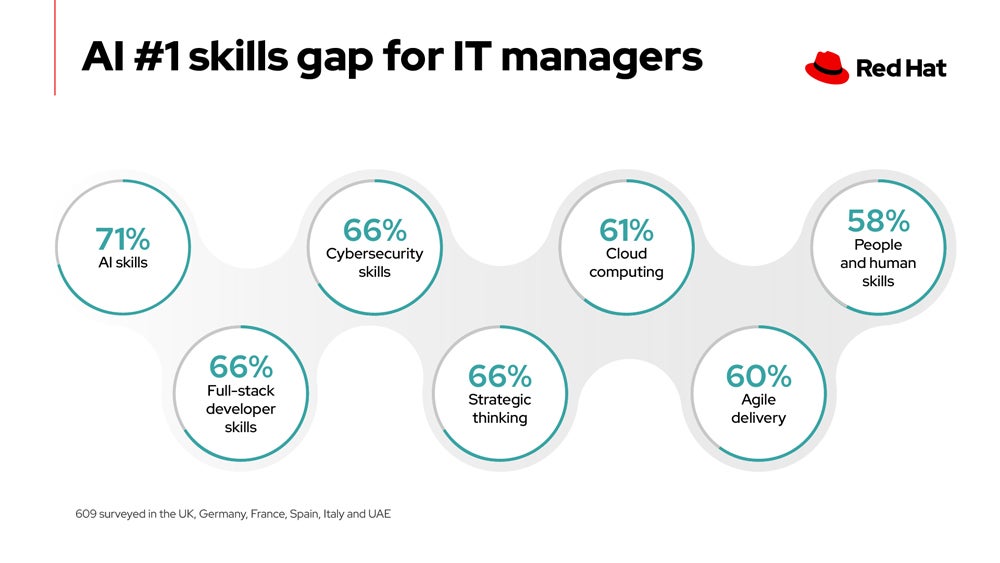
Artificial intelligence expertise has become the most in-demand skill amongst IT managers in the U.K. in 2024, a survey has found, overtaking strategic thinking and the ability to tackle business-level issues.
Open-source software firm Red Hat surveyed 609 global IT managers from businesses with over 500 employees in August, including at least a hundred from the U.K., about the technical areas they were finding most difficult to hire for.
AI, including data science, large language models, and generative AI, was the most in-demand in the country, cited by 81%. This marks a 9% increase over October 2023, when the previous survey was taken.
Indeed, a separate report from June found that U.K.-based hiring managers will pay 45% more on average for those with demonstrable expertise in areas such as natural language processing, AI content creation, and chatbot development.
Conversely, the demand for strategic thinking among U.K. IT managers has dropped from 73% to 68% in the last 10 months.
SEE: UK Trails Behind Europe in Technical Skills Proficiency
Sam Marland, a senior manager of Solution Architecture at Red Hat, said that the need for AI skills has grown because managers are seeing the power of consumer-grade chatbots, such as ChatGPT and Gemini, and want to harness it for their own businesses.
He told TechRepublic via email: “We can draw a parallel back to the beginning of mobile computing when it was unclear exactly how the iPhone and other technologies would combine. Looking back now we see changes to the retail and banking experience and associated changes to the high street, which were not predicted.
“Companies looking to understand AI are also looking for leadership on how future changes will play out, how regulations may change, and how to best use their data to bring about these new customer experiences.
“This means enterprises are moving from what they are currently doing with analytics, data science and statistical modelling to something new. We are seeing a lot of interest in AI demos and tests without really knowing where the key value will come from yet.”
AI is also the most in-demand skill worldwide, with 71% of all survey respondents flagging a skills gap.
Demand for cyber security skills in the U.K. has also increased from 69% to 75% in the last 10 months, likely related to the swathes of high-profile cyber attacks. Marland put this down to global tensions, with more nation-state actors working on vulnerabilities, and GenAI lowering the barrier to entry for cyber attacks.
“Generative AI is simplifying attacks for people with little to no skill and helping people with a lot of skills form more sophisticated attacks,” he told TechRepublic.
SEE: Report Reveals the Impact of AI on Cyber Security Landscape
He added that businesses are taking an “increasingly holistic” approach towards tech skills. Instead of focusing narrowly on specific technical skills, they are emphasising the broader impact of technology, such as in sustainability.
Marland told TechRepublic: “With the need to address sustainability concerns, organisations seek the ability to monitor and optimise workloads—especially but not just AI workloads—build sustainability strategies, and be strong on AI ethics.”
At the same time, tighter budgets mean that managers are looking to alleviate skills gaps in AI and cyber with technical solutions. The shortages “underscore the need for ongoing investment in workforce development and smart partnering beyond the organisation’s walls,” according to senior vice president of Red Hat EMEA, Hans Roth.
Marland added: “This year, infrastructure and operations groups have been building self-service capabilities to enable the developer, emphasising internal services that provide faster time to market through cloud-native development and greater scalability.
“As AI is added to a wide range of systems and management tooling, it becomes critical to add automated control and compliance to scale. Policy as Code is essential to achieving efficiencies and retaining control and compliance.”
Find out more about how to overcome the security skills gap in a panel discussion by the ISC2, or take a look at some of the best AI courses for 2024.